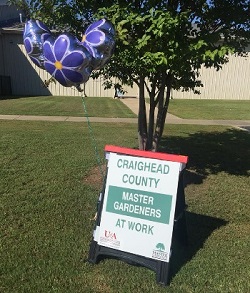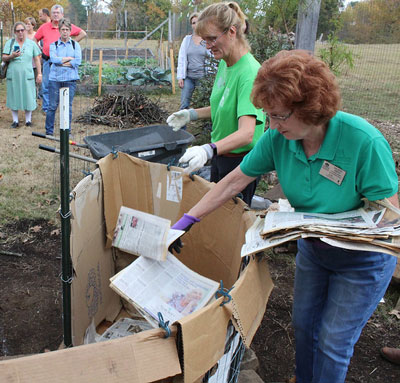How to Become a Master Gardener
As a Master Gardener you serve your community in a variety of ways, and in turn, you receive training on many aspects of horticulture while making meaningful relationships and having enriching experiences.
What does it mean to be a Master Gardener?


As horticultural trained volunteers, Master Gardeners extend research-based information through demonstration and educational programs using horticulture best practices, strengthening communities and families throughout Arkansas.
Master Gardeners serve their local community by answering questions, researching specific problems, planting educational and therapeutic gardens, providing public speakers and much more.
How much time is involved?
After completing your 40-hour horticulture training you are required to complete 40 working hours and 20 learning hours during your first year. In your subsequent years you will provide only 20 working hours and 20 learning hours.
What does it cost?
The required 40 hour Master Gardener training differs depending on which training option your location provides as well as host site fees. Check with your county extension office for cost of the class.
*Note: Training opportunities vary based on your local extension agent's availability.
Check with your County Extension Agent for training options in your area.
Who is eligible?
Anyone with horticultural skills, a willingness to learn, and a desire to help others.
What are the responsibilities?
Following a comprehensive training in horticulture, Master Gardeners have one year from the end of training to complete the agreed upon volunteer time. Usually the volunteer work is done within the geographical area served by the unit office conducting the training. Special arrangement can be made for some tasks outside one of the units.
Master Gardener volunteers are responsible for completing and reporting planned activities to an Extension agent. If daytime employment interferes with volunteer work, arrangements can be made to work evenings or weekends. Sometimes the volunteer's work can be done outside the office, E.G., research, writing, artwork. Many activities are interagency projects and involve working with parks and recreation departments, nursing homes, city departments, etc.
What kind of volunteer opportunities are available?
Since our Master Gardeners have wide range of expertise, we offer many types of opportunities. Those might include but are not limited to the following:

- Create and maintain demonstration gardens
- Produce a monthly home horticultural newsletter
- Help set up and maintain Web site
- Contribute to the Master Gardener Handbook
- Maintain office reference library
- Answer gardening questions for the community
- Collect soil samples in residential area
- Participate in on-site lawn clinics
- Photograph Master Gardener Projects
What are the benefits?
It is often said that the Master Gardener Program is more than 'just a horticulture class'—and it is. As a Master Gardener you are afforded many of the resources of the University of Arkansas.
Master Gardeners receive many hours of training in botany, soil science, plant propagation, pest management, pesticide and herbicide usage, vegetable and ornamental plant gardening, plant and weed identification, pruning and other horticulture related subjects.